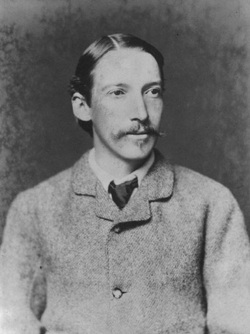" . . I like hourglasses, maps,
the sight and touch of
eighteenth century books,
the taste of coffee
and the prose of Stevenson . . ."
— Borges --

RLS c. 1879
Robert Louis Stevenson's best-known books (Treasure Island, Kidnapped, Dr Jekyll and Mr Hyde) are very well known indeed. Perhaps Jekyll and Hyde suffers from being too well known. Visit the Stevenson Cottage in Saranac Lake New York, and the guest book gives a record of travellers from around the world who have made the journey to the Adirondacks and up the hill to the little building where Stevenson spent a winter in the company of his wife, her son, and his mother. "The climate comprised every variety of unpleasantness: it rained, it snowed, it sleeted, it blew, it was thick fog; it froze — the cold was Arctic; it thawed — the discomfort was worse; and it combined these different phases in every possible way." ‡ The Stevenson family stayed here from October 1887 through April 1888; with the coming of spring, the group would resume their journey to the west, winding up in Samoa, where Stevenson died in 1894, ten days short of his 44th birthday.
The first published fiction by RLS, a Lodging for the Night [1887], predates his literary celebrity by a decade; if known then, it was for essays and travel books; his studies of French medieval literature also produced an essay on François Villon. Perhaps not top-notch RLS (I confess that I am puzzled why he Englished the poet's name, unless to create a kind of pun, giving the famous surname a more villainous pronunciation) yet the theme of human double nature, more famously explored in Jekyll and Hyde, is present here. The criminal element of the poet's career has been played down or overlooked in subsequent popular treatments of Villon, though I believe I detect traces of RLS underlying John Barrymore's performance in Beloved Rogue.
For RLS, the Poet is more suggested than displayed; it is clear that the man is no innocent, even if he does not actually commit the crime with which the story opens. To say our hero suffers the bad luck of being in the wrong place at the wrong time with the wrong company does not fully absolve him; the dialogue with which the story concludes does not fully condemn him. RLS was brought up under the stern Protestant traditions of Scotland; the magic potion created by Dr Jekyll does not transform him into Mr Hyde: it releases Mr Hyde.
‡ Balfour, Graham; The Life of Robert Louis Stevenson, (in two volumes with portraits);
Charles Scribner's Sons, 1911
The first published fiction by RLS, a Lodging for the Night [1887], predates his literary celebrity by a decade; if known then, it was for essays and travel books; his studies of French medieval literature also produced an essay on François Villon. Perhaps not top-notch RLS (I confess that I am puzzled why he Englished the poet's name, unless to create a kind of pun, giving the famous surname a more villainous pronunciation) yet the theme of human double nature, more famously explored in Jekyll and Hyde, is present here. The criminal element of the poet's career has been played down or overlooked in subsequent popular treatments of Villon, though I believe I detect traces of RLS underlying John Barrymore's performance in Beloved Rogue.
For RLS, the Poet is more suggested than displayed; it is clear that the man is no innocent, even if he does not actually commit the crime with which the story opens. To say our hero suffers the bad luck of being in the wrong place at the wrong time with the wrong company does not fully absolve him; the dialogue with which the story concludes does not fully condemn him. RLS was brought up under the stern Protestant traditions of Scotland; the magic potion created by Dr Jekyll does not transform him into Mr Hyde: it releases Mr Hyde.
‡ Balfour, Graham; The Life of Robert Louis Stevenson, (in two volumes with portraits);
Charles Scribner's Sons, 1911
